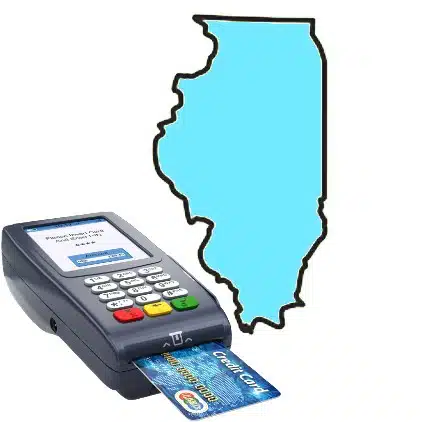If the Illinois Interchange Fee Prohibition Act survives the legal challenges it faces, the law would “create significant market distortions,” says a recent report from the International Center for Law & Economics, a Portland, Ore.-based nonprofit research and policy center.
Some of the most significant impacts on the market, according to the study, would include more complicated transactions and higher discount rates for some merchants and reduced card rewards and other benefits for consumers.
The Illinois Interchange Fee Prohibition Act, scheduled to take effect July 1, exempts merchants in the state from paying interchange on sales tax and tips in exchange for a $1,000 monthly state cap on what merchants earn for collecting sales tax. The law applies to all card networks.

The latest report comes as some studies show U.S. merchants pay more in card-acceptance costs than those in any other country. The toll came to $224 billion last year, with interchange fees alone accounting for $143 billion of that amount, according to a recent study by CMSPI, a payments-research group. Effective rates for U.S. card acceptance reached 1.7% last year, up from 1.36% in 2009, according to the study.
Illinois is the only state so far to pass such a law, despite numerous attempts in other states to pass similar legislation. Georgia, Tennessee, and Florida have established committees to study the potential effects of prohibiting interchange on sales tax.
For merchants with a simple POS terminal, as opposed to a more advanced, integrated POS system, separating out sales tax and tips from a transaction will be cumbersome. Experts say these merchants will most likely end up running two transactions— one for the base pretax and tip amount of the transaction and a second one for sales tax and tips exempt from interchange.
Running two transactions per purchase poses several potential problems for merchants, says Julian Morris, a senior scholar with the ICLE and author of the report.
One problem is that one of the two transactions will not be authorized, which could create friction at the point of sale and prompt some consumers to pay in cash, which reduces card volume, or take their business elsewhere.
“Running two transactions increases the time it takes to complete a transaction in general,” Morris says. He adds that the friction from running two transactions would be especially harmful to high-throughput merchants, such as quick-serve restaurants.
Another issue is that data entry errors can occur, some observers note. “Two transactions mean twice the risk of data-entry error,” says Eric Cohen, chief executive and founder of Merchant Advocate, a Colts Neck, N.J.-based group that works to cut card-processing fees. “Even if both transactions work, it’s a complication at the point of sale.”
The Illinois law has a provision for less technologically sophisticated merchants to manually report sales tax and tip data to their acquirers within 180 days of the transaction to recover interchange then. But the process still creates additional work for merchants and acquirers, some observers argue.
As card issuers see less interchange revenue on transactions in Illinois, it is likely they will compensate by reducing rewards and other benefits, work with card networks to boost interchange to recover lost revenues, or do both, the report argues. “In other words, states that prohibit the collection of interchange fees on taxes will create a significant negative externality for consumers and/or merchants in other states,” notes Morris in the report.
“If a law like this is to be passed, it needs be done so on a national basis, not state-by-state,” Cohen adds.
Another potential problem for merchants is that those paying a blended rate set nationally would likely not see any reduction in their merchant discount rate, Morris argues.
“Merchants who use a gateway, such as Stripe or Square, currently pay a blended merchant discount rate that is set nationally, and would therefore not see any MDR [merchant discount rate] reduction. It seems likely that most other acquirers who offer blended MDRs would not reduce their rates either, as they would incur additional costs associated with implementing the interchange-fee carveout, which would be passed through to their merchant customers. Indeed, it is possible that the implementation costs to acquirers would be sufficient that they would increase their blended MDR,” Morris writes.
In addition, merchants paying “interchange plus” would also likely see an increase in the “plus component” of their MDR to cover the acquirer’s cost of complying with the law, the report says.
“Illinois legislators really did not think this law through,” Morris says. “Passing this law in Illinois is bad. Doing it in multiple states would be worse.”







